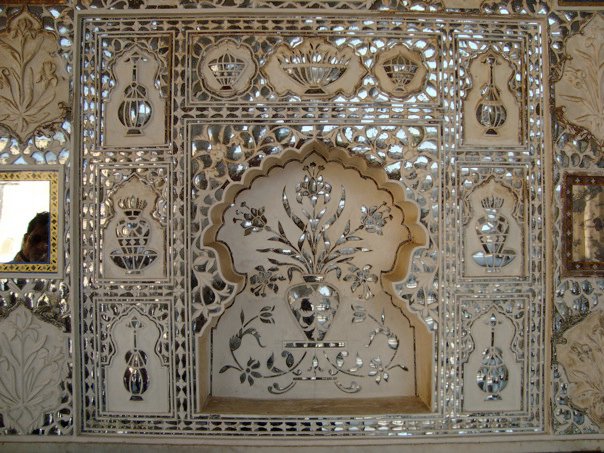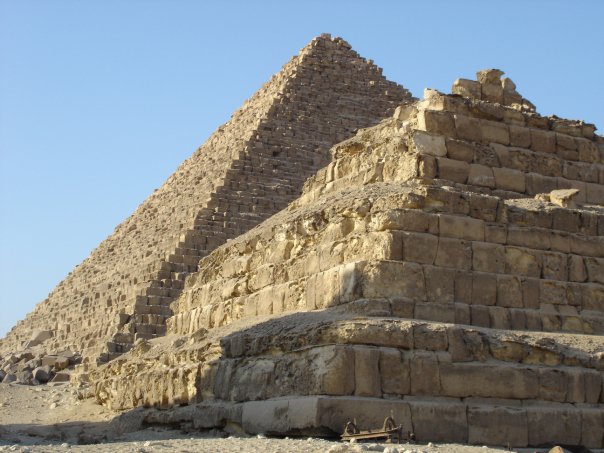Parshas Vayakhel-Pekudei: Building a Home for Hashem

Inside a palace in India, the walls of rooms are covered in mirrors. It certainly LOOKS like it's a room fit for a king... but is it fit for the King of kings?
Most of us don’t live in grand palaces, but trust me, there are plenty of them out there in the world. There are beautiful buildings, full of gold and jewels, covered from top to bottom in detailed sculptures. I have seen rooms where literally every surface is glittery with silver and mirrors, gems and glass. These are the places we think are fit for a king.
In this week’s parsha, the Jewish people build a home for the ultimate King, G-d. They flock to Moshe (Moses), bringing him gold, silver, copper, blue, purple and red-dyed wool, goat hair, spun linen, animal skins, wood, olive oil, herbs, and precious stones. The mishkan (tabernacle) was literally covered with gold and silver, and finished off with the finest brightly-colored materials. This was a mobile palace truly fit for the King of Kings.
But there was much more to the building of the mishkan than simply the physical materials and their monetary value. Every item represents something much deeper and more holy. We are reminded of this when the women give their copper mirrors to make the basins. Moshe doesn’t think these items used by the women to make themselves beautiful in Egypt are “holy” enough to be used in the mishkan, but G-d disagrees. It is because the women made themselves beautiful that they were able to entice their husbands to share relations with them – and thus they perpetuated the Jewish population.
The Lubavitcher Rebbe also teaches us that gold that was given represents the purity and perfection of the tzaddik (holy person). Silver represents the baal teshuva (returnee to Judaism) who yearns to return to G-d’s service (the same word in Hebrew means both “silver” and “yearn”). Finally, copper, which is a low, earthy metal, represents the good deeds of the sinner. Thus, we see that every type of person has something to contribute and all Jews are important to and loved by G-d.

The pyramids of Egypt were built by kings and were filled with treasures, but built by slaves (many of whom gave their lives), they simply wouldn't be fit places for the prescence of G-d to dwell, no matter how impressive they may be.
So G-d didn’t just go dwell in the mishkan because it was so fancy and expensive. He went to dwell there because of the intricacy, the meaning, and the importance of every little thing that went into building it. It was the intentions – more than the gold and the glitter – that were important to Him.
So when I think back on most of those palaces, castles, and temples I’ve seen in my travels, I can see how even though they are fancy and expensive, they are not suitable dwelling places for G-d. Some were built with tax money extracted painfully from poor peasants. Some were built by slaves. Some were built to worship idols. None of these is the way to build a home for G-d, no matter how nice of a place you may think He deserves.
Instead, we can each make our own dwellings into mishkans. We don’t need three fancy ceilings or gold-plated walls to make our own homes for G-d. Because it isn’t the physical aspect of it that really matters to Him. What is important is to have the right intentions and to make sacrifices in the right ways. Instead of buying a nicer car, we should buy a nicer silver menorah. Instead of buying expensive paintings to decorate our walls, we should spend money on beautiful candlesticks to use for Shabbat and nice place settings for our Shabbat meal. Instead of buying a flat-screen TV, we should buy books of Torah (including Rabbi Ben’s book, Freiing Out!). In short, it does not matter how much or how little money we have, we can use whatever we have got to make our homes into a place for Hashem to live, too.






No Responses to “Parshas Vayakhel-Pekudei: Building a Home for Hashem”
Trackbacks/Pingbacks